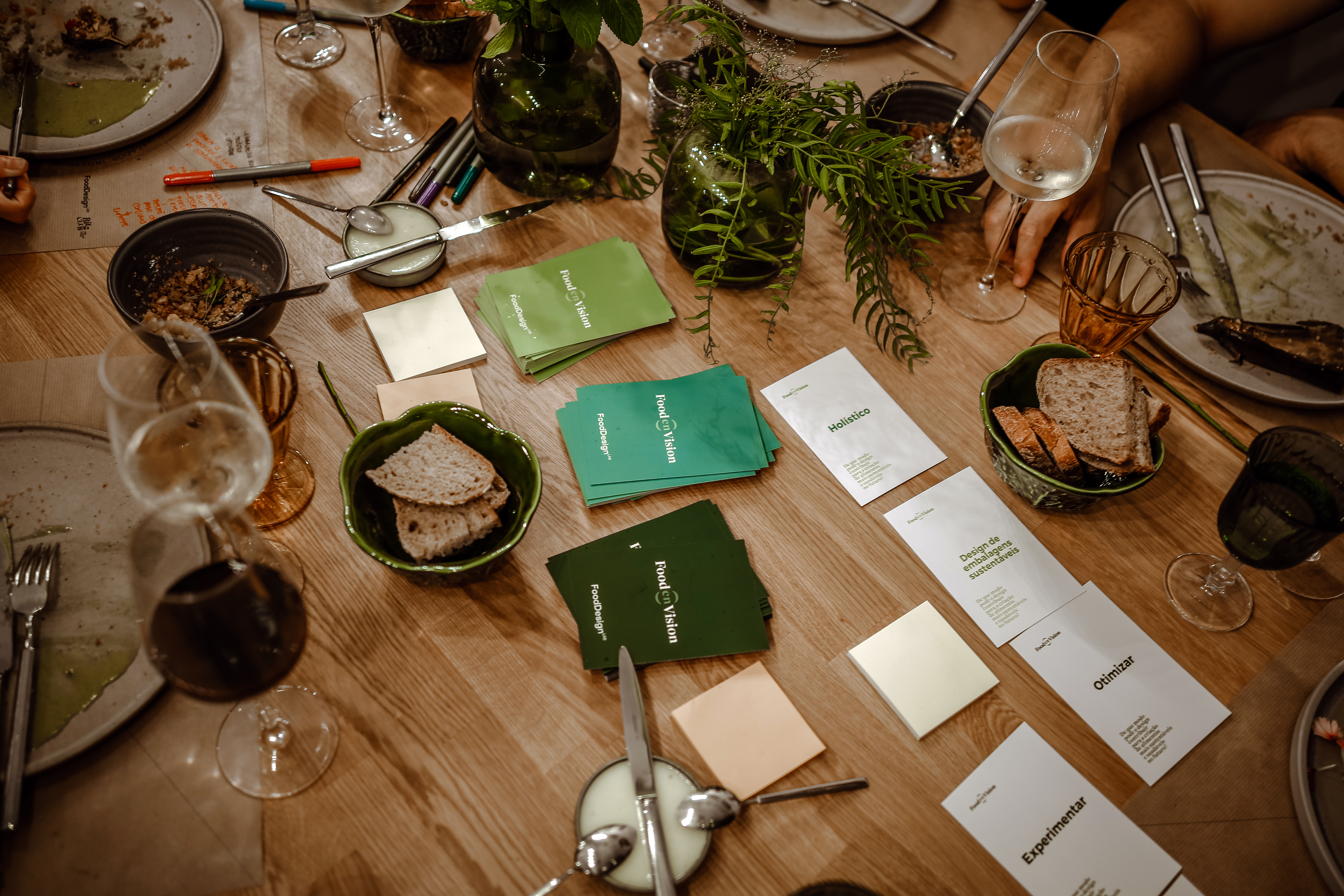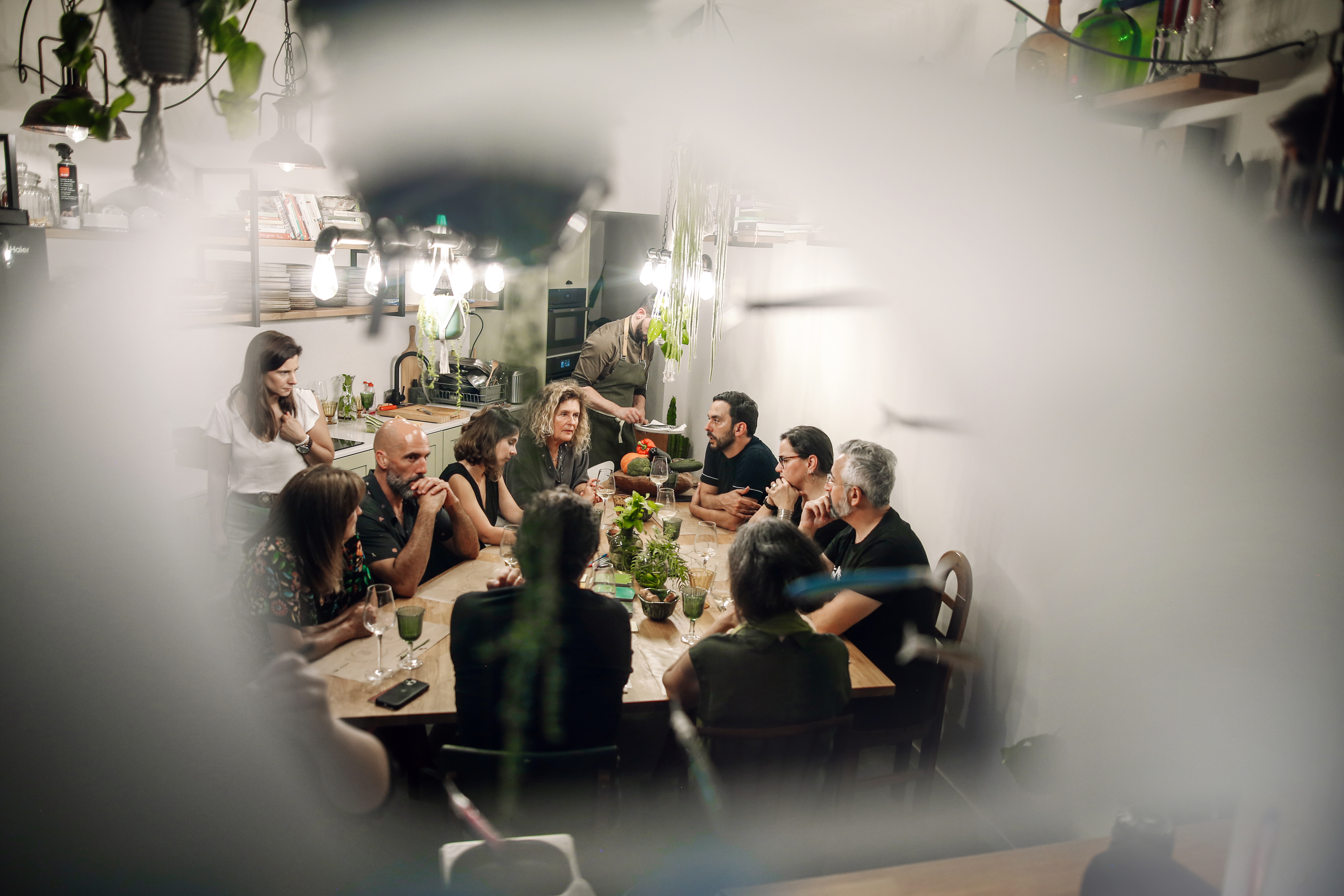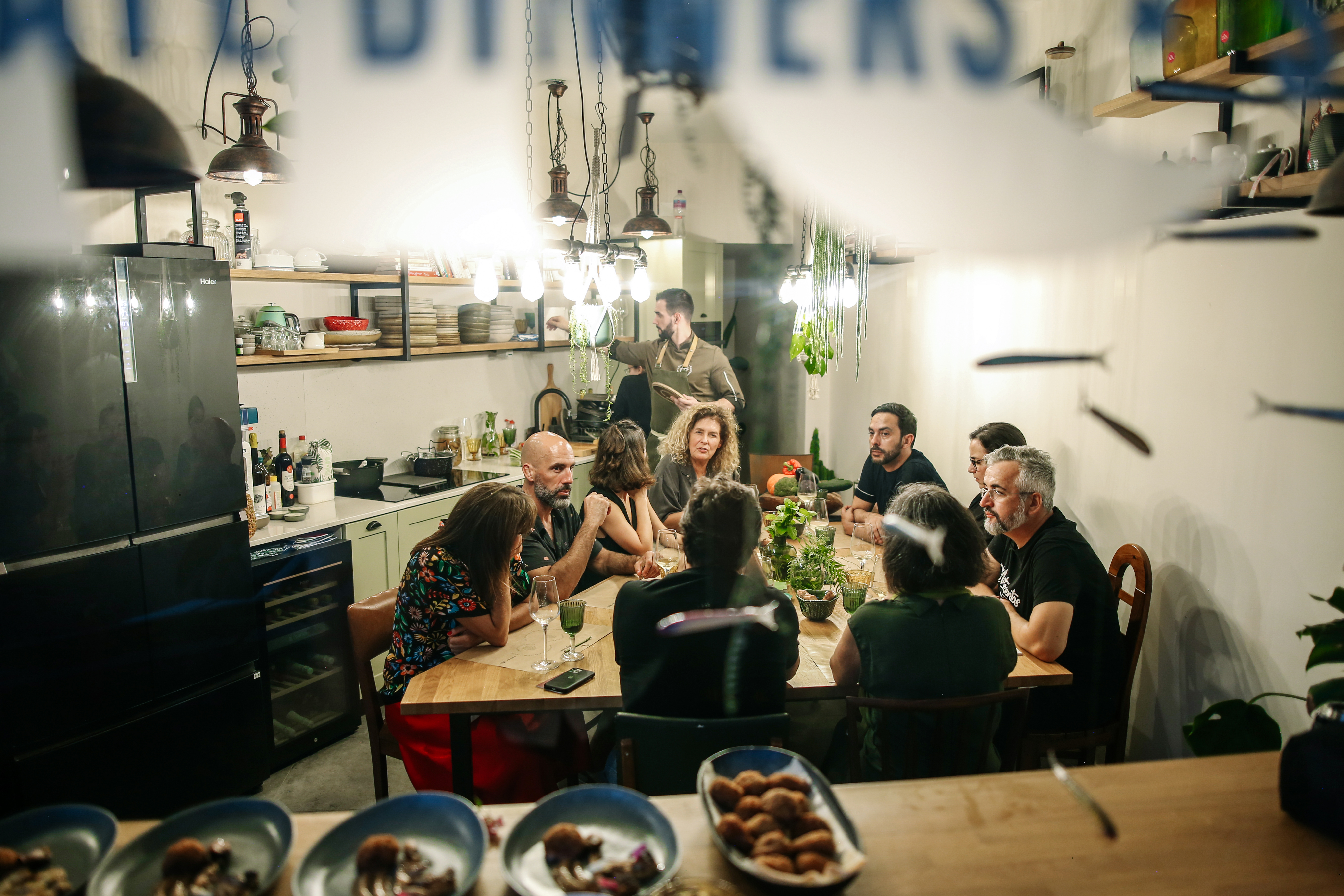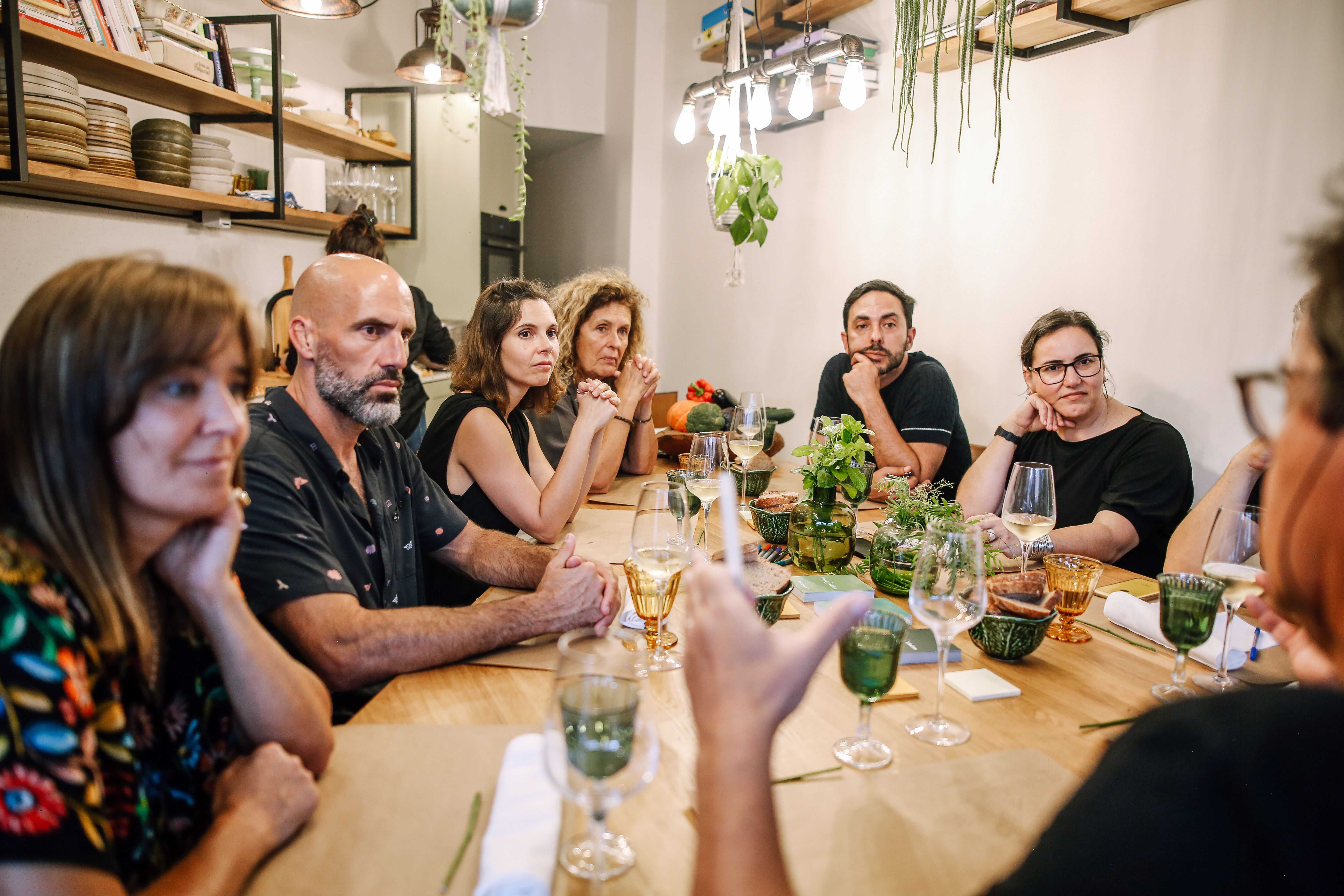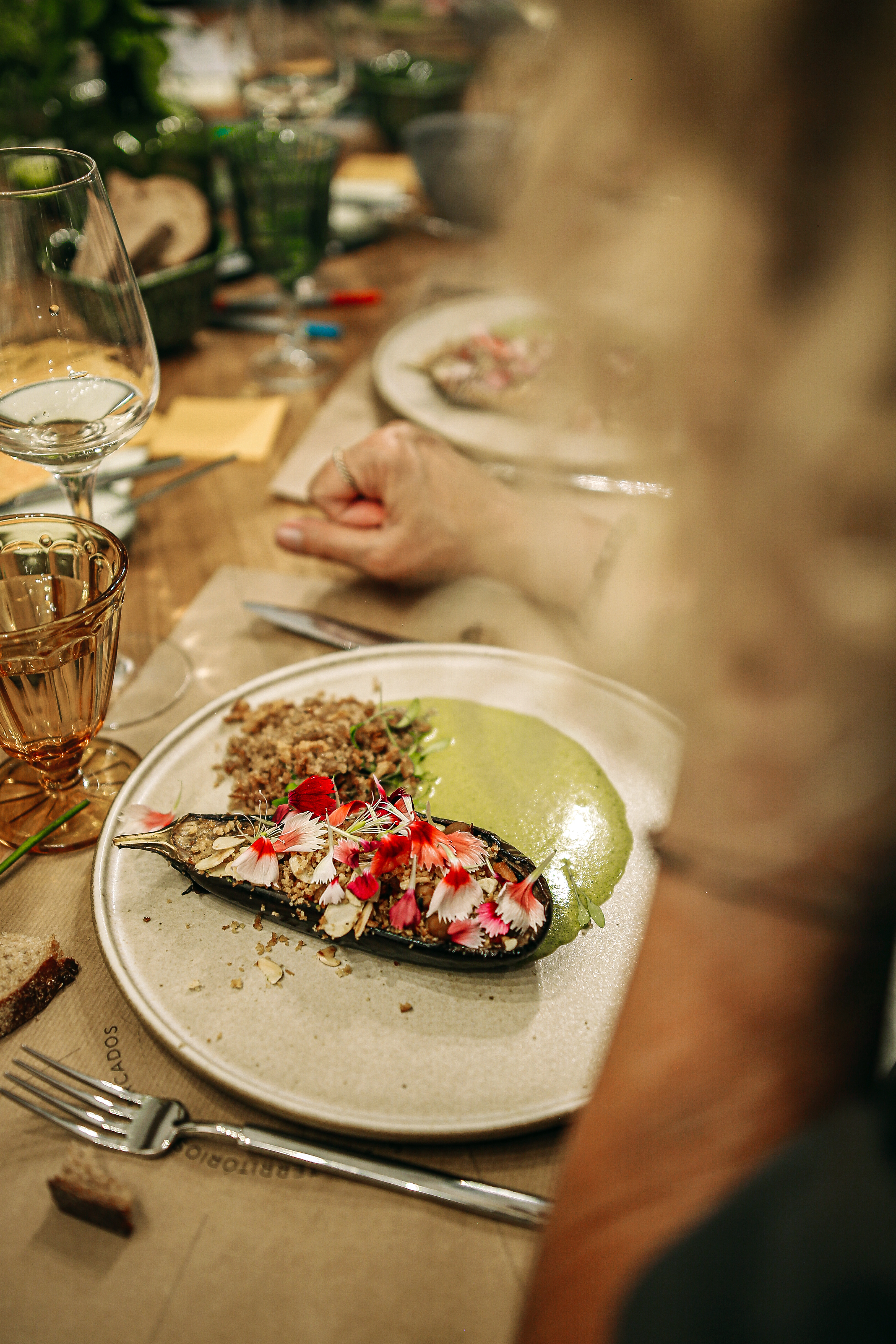Prioritising the places and people that need it the most
Food (En)vision
Food (En)Vision (Re)think the role of design in food systems
Food (En)Vision invites you to an innovative series of Jefferson-style dinners that blend the realms of food and design. Hosted by the Food Design Lab Lisbon, these intimate gatherings bring together experts from various fields to examine how food design can transform our relationship with food. The project aims to inspire creativity, challenge conventions, and create a more sustainable, inclusive, and impactful future for food systems through shared meals and engaging discussions.
Portugal
Local
Lisbon
It addresses urban-rural linkages
It refers to other types of transformations (soft investment)
Yes
2024-11-08
No
No
No
As a representative of an organisation
Food (En)Vision aims to harness the potential of food design to transform the food system. F(E) explores how food design can encourage sustainable, inclusive, and transparent practices in food production, consumption, and waste through innovation, collaboration, and dialogue. Its primary goal is to revolutionize our understanding of food design and its impact on society and the environment. The project engages diverse stakeholders, including designers, chefs, food critics, producers, academics, and professionals from the technology, agriculture, and sustainability sectors. Additionally, it reaches a broader audience that includes food enthusiasts, policymakers, and organizations committed to food system sustainability. Food (En)Vision achieves its goals through several key objectives. It facilitates knowledge exchange by organizing Jefferson-style dinners, where experts share food design and sustainability insights. The initiative promotes interdisciplinary collaboration by providing a platform for dialogue that challenges conventions, inspires creativity, and nurtures innovation. Moreover, it seeks to enhance public awareness by distributing outcomes through social media, articles, interviews, and a white paper designed to reach and inspire a wider audience. The project also advocates for design-driven approaches to improve food literacy, sustainability, and cultural awareness. The first dinner brought together diverse experts, fostering meaningful dialogue on the future of food design. These discussions were documented and contributed to the white paper to inspire further action. This initiative has strengthened a community of professionals committed to transforming food systems while engaging broader audiences by sharing insights and promoting the value of food design.
Sustainability
Inclusivity
Food Literacy
Food Systems
Food Design
The project aims to redefine sustainability within food systems. Its primary objectives include promoting sustainable practices in food production, consumption, and waste management through the lens of food design and interdisciplinary collaboration. Here's how these goals have been achieved and why the project is exemplary: 1. By fostering cross-disciplinary dialogues through Jefferson Dinners, the project brings together diverse stakeholders. This intimate setting encourages critical thinking and the exchange of perspectives on food system challenges, enhancing understanding and collaborative problem-solving; 2. By promoting sustainable practices and focusing on topics such as food waste, sustainable production methods, and transparency, the project highlights practical solutions to contemporary food issues. The discussions and resulting insights aim to inspire actionable change in how food is cultivated, consumed, and valued. 3. To disseminate knowledge to a broader audience and raise awareness and education, including social media shares, articles, and a White Paper. This approach democratizes the insights gained and encourages public engagement with sustainable food practices; 4. By catalyzing innovation as a tool for transformation. It leverages creativity and food design thinking to address systemic challenges, demonstrating the potential for innovative solutions that are socially and culturally relevant; and 5. By creating a legacy through documenting insights and generating a manifesto, the project ensures its sustainability objectives have a long-term influence, guiding future endeavors in food design. This project exemplifies sustainable innovation by integrating diverse expertise, driving public discourse, and inspiring systemic change in the food industry.
The Food (En)Vision project enriches food’s aesthetic and experiential dimensions through design, transforming meals into multisensory and intellectual experiences that redefine how people interact with food. Each dinner features curated menus and settings that align with discussion themes, creating immersive environments that enhance sensory engagement and cultural significance. The diverse mix of participants fosters cultural exchange, where shared meals become a platform for traditions, ideas, and inclusivity. Food design is used as a storytelling tool, invoking emotions, challenging perceptions, and creating lasting memories through carefully selected ingredients and presentation. By integrating intellectual discourse into dining, the project elevates meals from routine to reflective experiences, fostering a deeper appreciation of food as both sustenance and art. Celebrating local and global cultures, it highlights regional ingredients and culinary traditions while engaging with global food trends, strengthening cultural appreciation and broadening narratives. The project nurtures lasting connections that extend beyond the event, encouraging meaningful interactions and fostering a network of advocates for cultural and experiential food innovation. Documenting insights from these discussions, "Design (En)Vision" creates a repository of knowledge that enhances cultural understanding, demonstrating how food can be a powerful medium for communication and artistic expression. Through this fusion of design, dialogue, and culture, the project illustrates the transformative power of food as a meaningful, resonant experience.
The Food (En)Vision project prioritizes inclusion by ensuring accessibility, equitable participation, and diversity in food design. It fosters diverse representation by bringing together individuals from different professional, cultural, and socio-economic backgrounds, enriching dialogue, and fostering empathy. Partnerships with organizations like FORK and Imppacto help make participation affordable and accessible, ensuring broad demographic inclusion. The Jefferson Dinner format promotes inclusive governance, enabling all attendees to contribute equally in a flat, respectful structure where every voice is valued. Thoughtfully designed menus accommodate dietary needs, and accessible venues create a welcoming environment. By addressing food justice, sustainability, and cultural identity, the project explores how food design can drive societal transformation. Discussions highlight systemic barriers and propose innovative solutions for a more equitable food system. Food (En)Vision empowers underrepresented voices, inspires societal change, and provides a replicable model of inclusivity. Through its commitment to diversity, equity, and accessibility, it demonstrates how inclusive food design can unite people, challenge inequities, and inspire collective action for a more just and sustainable food future.
The Food (En)Vision project fosters an open, participatory platform where citizens, professionals, and civil society organizations collaboratively shape a more sustainable food system. Through Jefferson Dinners, attendees—including designers, chefs, producers, and researchers—actively engage in discussions, ensuring solutions are grounded in real-world experiences rather than theory. Civil society organizations like FORK play a vital role, bridging insights from these discussions to broader policy conversations and cross-sector collaborations. The project addresses food affordability, sustainability, ethics, and cultural identity by incorporating diverse perspectives. The ideas generated are documented and disseminated via articles, social media, and white papers, influencing public discourse and policy. Stronger community networks emerge, fostering lasting collaborations, advocacy efforts, and new initiatives. Participants co-create themes, amplify discussions through community-driven networks, and implement actionable insights into projects, businesses, and policy recommendations. As a model for participatory design, Food (En)Vision empowers citizens as active agents of change, ensuring food design is inclusive, reflective of societal needs, and capable of driving meaningful transformation in how we produce, consume, and think about food.
The Food (En)Vision project engages stakeholders at local, regional, national, and European levels, creating a scalable model for food innovation. Locally, chefs, designers, and small producers participated in Jefferson Dinners, sharing challenges and experimenting with sustainable solutions, while community organizations ensured inclusivity. Regionally, policymakers, research institutions like ELISAVA, and cultural organizations bridged academia and industry, aligning discussions with sustainability strategies and funding opportunities. Nationally, food advocacy groups and government agencies connected the project to Spain’s National Food Strategy, amplifying its impact through media and policy discussions. At the European level, EU research programs, international gastronomy networks, and sustainability think tanks linked the project to broader funding and policy frameworks, enabling scalability. This multi-level engagement strengthens the role of food design in shaping sustainable food systems, blending grassroots innovation with high-level policy. By integrating local expertise with national and European strategies, Food (En)Vision demonstrates how food design can drive systemic change through collaboration, research, and policy alignment.
The Food (En)Vision project takes an interdisciplinary approach to food design, merging diverse fields to explore its potential in shaping future food systems. By uniting experts from gastronomy, sustainability, design, technology, social sciences, art, and policy, the project fosters holistic discussions on sustainability, culture, and sensory experiences. Chefs and food designers translate sustainability insights into edible narratives, while experience and product designers ensure engaging, eco-conscious interactions. Food tech researchers introduce innovations like alternative proteins and 3D printing, bridging tradition with forward-thinking solutions. Social scientists and philosophers contextualize food within identity, memory, and ethics, while artists provide historical and symbolic perspectives, enriching the experience. Policy experts and business leaders align discussions with real-world applications to ensure tangible impact. The Jefferson Dinner format enables fluid knowledge exchange, allowing disciplines to challenge and inspire one another. This synergy fosters the cross-pollination of ideas, innovative problem-solving, and immersive learning experiences that make complex issues accessible. By integrating science, creativity, and policy, Food (En)Vision sets a benchmark for collaborative food innovation, demonstrating how food design can drive systemic change, sustainability, and cultural transformation.
The Food (En)Vision project redefines food design by blending gastronomy, sustainability, and policy into an immersive, interdisciplinary experience. Unlike mainstream initiatives emphasizing product innovation or aesthetics in isolation, this project encourages systemic change through participatory dialogue. The Jefferson Dinner format replaces traditional conferences with intimate, co-creative discussions, dismantling hierarchical barriers and promoting real-world collaboration. Bringing together chefs, designers, scientists, and policymakers transforms food into a platform for governance and social justice. Unlike typical industry-driven trends, the project incorporates cultural, environmental, and technological perspectives, broadening food design beyond consumption to serve as a tool for equity and systemic transformation. Real-time knowledge sharing guarantees immediate applications, while documentation through media and a White Paper amplifies its influence beyond the event, shaping public discourse and policy. By prioritizing inclusion and challenging elitist food innovation, Food (En)Vision offers a scalable, participatory model where food serves as a catalyst for sustainability, cultural transformation, and systemic change.
The Food (En)Vision project utilizes a participatory, interdisciplinary, and systemic approach to food design, integrating dialogue, experiences, and knowledge sharing. Centered around Jefferson Dinners, the project promotes structured yet open conversations where experts, creatives, and stakeholders exchange insights in a co-creative environment. This inclusive format encourages active participation and cross-sector collaboration, dismantling traditional silos. The project employs systems thinking to examine food’s cultural, ecological, and economic dimensions by combining gastronomy, sustainability, technology, policy, and art. The dining experience itself acts as a learning tool, using curated menus and sensory storytelling to convert abstract issues into tangible, emotional moments. Discussions are documented via social media, articles, and a White Paper, ensuring broader dissemination and long-term impact. The iterative framework allows for continuous refinement and scalability, adapting to emerging food challenges. More than merely a food design initiative, Food (En)Vision pioneers a new methodology where participatory dialogue, interdisciplinary exchange, and experiential learning position food as a transformative force for shaping the future.
The Food (En)Vision project is a scalable and transferable model for collaborative food innovation that is adaptable across various contexts. Its Jefferson Dinner format—structured yet inclusive food-centered discussions—can be implemented in policy forums, academic institutions, and community-led sustainability dialogues. The interdisciplinary collaboration model, uniting chefs, designers, policymakers, and technologists, can be applied to urban planning, circular economy projects, and educational initiatives. Using food as a sensory learning and storytelling medium can enhance museum exhibitions, corporate strategy sessions, and food education programs. Documenting and sharing insights through articles, white papers, and social media ensures a broader impact, benefiting research organizations, NGOs, and policy councils. The adaptable framework allows for customization to local food systems, cultural contexts, and economic conditions, making it relevant to grassroots movements, city sustainability projects, and innovation hubs. More than just an event, Food (En)Vision is a replicable methodology transforming food design into a tool for systemic change, sustainability, and cultural dialogue worldwide.
The Food (En)Vision project addresses global food challenges through locally driven solutions integrating sustainability, culture, and social innovation. To tackle climate change and enhance food system sustainability, the project advocates for regenerative agriculture, local sourcing, and zero-waste cooking, engaging farmers, chefs, and policymakers in discussions about circular food systems. In response to food inequality, it emphasizes affordable, nutritious meals made with seasonal ingredients and encourages community-driven food initiatives. To combat the loss of food culture and biodiversity, the project revitalizes traditional foodways, champions heirloom crops, and promotes seed sovereignty. Reconnecting consumers with food systems leverages experiential learning, urban farming, and short supply chains to encourage mindful consumption. Finally, to create inclusive food governance, the Jefferson Dinner format ensures that all stakeholders contribute equally, fostering collaborative solutions shared globally through open-source knowledge networks. Food (En)Vision illustrates that systemic food change must be rooted in local engagement, participatory dialogue, and cultural shifts, offering a scalable and adaptable model to reshape global food systems from the ground up.
The Food (En)Vision project has catalyzed systemic change in food design through interdisciplinary dialogue, cultural exchange, and sustainability-driven innovation. Its inaugural dinner led to a White Paper documenting insights from experts, serving as a reference for policymakers, designers, and academics. The project has established an ongoing platform for cross-sector discussions, promoting new partnerships and strengthening networks for food innovation. Public engagement through articles, interviews, and social media has expanded its reach, positioning it as a key voice in transforming progressive food systems. Direct beneficiaries—including chefs, designers, policymakers, farmers, and researchers—have acquired knowledge, collaborations, and new methodologies, while consumers, food businesses, and cultural institutions reap indirect benefits through policy influence and sustainable food practices. The project has contributed to Spain’s National Food Strategy by integrating design methodologies into sustainability and food security discussions. Redefining food design as a tool for systemic change challenges conventional notions and offers a scalable model adaptable to various regions and industries. With ongoing impacts through documentation, policy engagement, and European collaborations, Food (En)Vision is a benchmark for how food design can drive long-term transformation.

